IAAF World Championships Moscow 2013 - Interviews & RacesAug 16, 2013 by David Monti
RRW: Farah Completes World Championships Double with 5000m Win
RRW: Farah Completes World Championships Double with 5000m Win

FARAH COMPLETES WORLD CHAMPIONSHIPS DOUBLE WITH 5000M WIN
By David Monti, @d9monti
(c) 2013 Race Results Weekly, all rights reserved. Used with permission.
MOSCOW (16-Aug) -- Eight laps into a herky-jerky men's 5000m final at the IAAF World Championships here tonight, defending champion Mo Farah felt a side stitch. He was worried if the pace increased soon, the stitch might derail his lofty goal of duplicating the 10,000m/5000m double gold medal performance from the Olympic Games last August. He took to pushing in his stomach to try to control it.
"I had a bit of a stitch and hoped that the pace wouldn't go as fast, and it didn't," Farah later observed.
The pace, in fact, seesawed from fast to slow and back several times during the race. It started with the shuffling pace so common in championships finals, then the next lap went by in just over 61 seconds after Kenya's Isiah Koech surged ahead, opening a large but unsustainable lead. His compatriot, Olympic bronze medalist Thomas Longosiwa, followed a few steps behind.
"I was trying to push," said Koech who finished fourth at the last edition of these championships two years ago in Daegu, Korea. "My plan was to run my best."
Farah and reigning silver medalist Bernard Lagat of the United States refused to react, and the pace slowed way down again (the fourth lap was timed in nearly 71 seconds), and the pack came back together. Farah finally took the lead with seven laps to go, more to steady the pace than to push it.
"I went to the front to control it and try to stay out of trouble," Farah told reporters.
Farah only led for two laps, and as the race went through the 3000m mark in a pedestrian 8:27.79, Koech again tried to speed things up. He turned the next lap in 62.33 seconds, enough to slim the lead pack to a manageable size.
"I like the pace when it is high," Koech explained. He continued: "I know Farah is faster than me (in the end)."
With two laps to go, Farah had the race right where he wanted it. He eased into the lead and started to press the pace. His penultimate lap took just 57.5 seconds, then he started the long kick that has brought him so many victories. He strode down the backstretch in full flight and Koech, Longosiwa, Lagat and Ethiopia's Hagos Gebrhiwet gave chase. Lagat said he was in just the right position to contend for a medal.
"In fact, I put myself in the best position all the way," Lagat said after the race, bleeding badly from a spike wound. He added: "I kept telling myself, 'feel composed, you're going to do this, you're going to do this.' I believed it one hundred percent."
Coming out of the final turn, Farah was still leading and and had found his highest gear. Koech and Longosiwa were right behind him, and looked like one would get silver and bronze, respectively. But Gebrhiwet, the world junior record holder for 3000m indoors, did not give up. He first passed Longosiwa, then just nipped Koech before the line. Lagat finished sixth, and his American teammate --and Farah's training partner-- Galen Rupp finished 8th.
"It was a bit difficult for me, but I'm happy with my outcome," Gebrhiwet said through a translator.
Farah ran the final lap in 53.51 seconds and the title was his in 13:26.98. In the last three global championships he was won five of the six gold medals on offer in the 5000m and 10,000m. He is the undisputed world #1.
"I was confident from having run a fast 1500m (at the Herculis Meeting in Monaco last month), and fast few races towards the end," Farah said. "And if it came down to the end I was confident in my speed." He added: "As an athlete you just want to be able to keep winning."
Officials had to look at the photo to determine who had gotten second place. In the end, Gebrhiwet was clocked in 13:27.259 and Koech in 13:27.260; just 1/1000th of a second separated them.
KIPROP ADVANCES EASILY IN MEN'S 1500M
In the semi-finals of the men's 1500m, defending champion Asbel Kiprop ran a textbook race, conserving his energy during the slow early pace, then only kicking as much as necessary to safely get the win in the first heat in 3:43.30.
"I had confidence because it wasn't going to be tough for me to finish amongst the top 5," Kiprop told Race Results Weekly. "So, I was confident during the heats."
Kiprop, 24, who finished a disappointing 12th at last summer's Olympic Games, said he was less confident about the final.
"But what I'm not confident (in), is the finals," he said, no longer grinning. "I have seen the second heat which went faster and people looked relaxed." He continued: "If things go well I might defend my title, but I have seen also Centrowitz, who is a bronze medalist. He easily relaxed in the second heat."
Centrowitz, who indeed earned the bronze medal behind Kiprop in Daegu two years ago while he was still a student at the University of Oregon, ran in the second --and much faster-- heat. He ran nearly the entire race in the back, and was in last place at the bell. But, he ran around nearly the entire field from the middle of the backstretch to the finish, clocking 54.8 seconds for his last lap and finishing second to Kenya's Nixon Chepseba, 3:35.88 to 3:35.95. Centrowitz said he might have waited just a little too long to start his drive for home.
"You know, I definitely gave myself a little, a lot to work for," Centrowitz said looking just a bit sheepish. He continued: "Obviously, I didn't want to cut it close, but I knew top-7 were going instead of top-5, so that helped a little bit. (I) relaxed a little bit more knowing that I didn't have to go from tenth to fifth."
Also advancing to the final were Kenya's Silas Kiplagat and Nixon Chepseba, Britain's Chris O'Hare (his first global final), and Morocco's Mohamed Moustaoui. Olympic silver medalists Nick Willis of New Zealand (7th in heat 1) and Leo Manzano of the United States (8th in heat 1), both failed to advance. Manzano managed a 52.5 second final lap, but it just wasn't enough.
"I really thought I had it in the tank," Manzano lamented.
USA PUT THREE INTO WOMEN'S 800M FINAL
In the women's 800m semi-finals, the American team successfully put three women into the final for the first time in the history of these championships. Alysia Montano led the first heat from gun to tape, clocking the fastest time of the night: 1:58.92. Her teammate, Brenda Martinez, ran a more conservative race. She moved outside from the chase pack on the final bend, held her form down the homestretch and finished second in 1:59.03, despite feeling the sting of fatigue in her legs.
"I went lactic pretty bad," said Martinez. "I'm strong enough to kind of hold and maintain so, yeah, I was kind of hurting that last bit."
The next three women in that heat --Ukraine's Natalia Lupu, Russia's Ekaterina Poistogova and the Czech Republic's Lenka Masna-- all advanced to the final.
In the second heat, which had a bumpy start with a lot jostling for position in the first 200 meters, defending champion Marina Savinova of Russia pulled away effortlessly from the field with half a lap to go, led to the tape, was was just beaten by Kenya's Eunice Sum, 2:00.70 to 2:00.73. The USA's Ajee' Wilson, who had been running in last place at 400m, made up ground in the final 100 meters to narrowly finish third, grabbing the last automatic qualifying position.
"I was sweating it, said Wilson, just 19 and last year's world junior 800m champion. "Actually, the last 150 I was feeling OK. I mean, I know I was in the back, but I knew I have a pretty strong kick."
By David Monti, @d9monti
(c) 2013 Race Results Weekly, all rights reserved. Used with permission.
MOSCOW (16-Aug) -- Eight laps into a herky-jerky men's 5000m final at the IAAF World Championships here tonight, defending champion Mo Farah felt a side stitch. He was worried if the pace increased soon, the stitch might derail his lofty goal of duplicating the 10,000m/5000m double gold medal performance from the Olympic Games last August. He took to pushing in his stomach to try to control it.
"I had a bit of a stitch and hoped that the pace wouldn't go as fast, and it didn't," Farah later observed.
The pace, in fact, seesawed from fast to slow and back several times during the race. It started with the shuffling pace so common in championships finals, then the next lap went by in just over 61 seconds after Kenya's Isiah Koech surged ahead, opening a large but unsustainable lead. His compatriot, Olympic bronze medalist Thomas Longosiwa, followed a few steps behind.
"I was trying to push," said Koech who finished fourth at the last edition of these championships two years ago in Daegu, Korea. "My plan was to run my best."
Farah and reigning silver medalist Bernard Lagat of the United States refused to react, and the pace slowed way down again (the fourth lap was timed in nearly 71 seconds), and the pack came back together. Farah finally took the lead with seven laps to go, more to steady the pace than to push it.
"I went to the front to control it and try to stay out of trouble," Farah told reporters.
Farah only led for two laps, and as the race went through the 3000m mark in a pedestrian 8:27.79, Koech again tried to speed things up. He turned the next lap in 62.33 seconds, enough to slim the lead pack to a manageable size.
"I like the pace when it is high," Koech explained. He continued: "I know Farah is faster than me (in the end)."
With two laps to go, Farah had the race right where he wanted it. He eased into the lead and started to press the pace. His penultimate lap took just 57.5 seconds, then he started the long kick that has brought him so many victories. He strode down the backstretch in full flight and Koech, Longosiwa, Lagat and Ethiopia's Hagos Gebrhiwet gave chase. Lagat said he was in just the right position to contend for a medal.
"In fact, I put myself in the best position all the way," Lagat said after the race, bleeding badly from a spike wound. He added: "I kept telling myself, 'feel composed, you're going to do this, you're going to do this.' I believed it one hundred percent."
Coming out of the final turn, Farah was still leading and and had found his highest gear. Koech and Longosiwa were right behind him, and looked like one would get silver and bronze, respectively. But Gebrhiwet, the world junior record holder for 3000m indoors, did not give up. He first passed Longosiwa, then just nipped Koech before the line. Lagat finished sixth, and his American teammate --and Farah's training partner-- Galen Rupp finished 8th.
"It was a bit difficult for me, but I'm happy with my outcome," Gebrhiwet said through a translator.
Farah ran the final lap in 53.51 seconds and the title was his in 13:26.98. In the last three global championships he was won five of the six gold medals on offer in the 5000m and 10,000m. He is the undisputed world #1.
"I was confident from having run a fast 1500m (at the Herculis Meeting in Monaco last month), and fast few races towards the end," Farah said. "And if it came down to the end I was confident in my speed." He added: "As an athlete you just want to be able to keep winning."
Officials had to look at the photo to determine who had gotten second place. In the end, Gebrhiwet was clocked in 13:27.259 and Koech in 13:27.260; just 1/1000th of a second separated them.
KIPROP ADVANCES EASILY IN MEN'S 1500M
In the semi-finals of the men's 1500m, defending champion Asbel Kiprop ran a textbook race, conserving his energy during the slow early pace, then only kicking as much as necessary to safely get the win in the first heat in 3:43.30.
"I had confidence because it wasn't going to be tough for me to finish amongst the top 5," Kiprop told Race Results Weekly. "So, I was confident during the heats."
Kiprop, 24, who finished a disappointing 12th at last summer's Olympic Games, said he was less confident about the final.
"But what I'm not confident (in), is the finals," he said, no longer grinning. "I have seen the second heat which went faster and people looked relaxed." He continued: "If things go well I might defend my title, but I have seen also Centrowitz, who is a bronze medalist. He easily relaxed in the second heat."
Centrowitz, who indeed earned the bronze medal behind Kiprop in Daegu two years ago while he was still a student at the University of Oregon, ran in the second --and much faster-- heat. He ran nearly the entire race in the back, and was in last place at the bell. But, he ran around nearly the entire field from the middle of the backstretch to the finish, clocking 54.8 seconds for his last lap and finishing second to Kenya's Nixon Chepseba, 3:35.88 to 3:35.95. Centrowitz said he might have waited just a little too long to start his drive for home.
"You know, I definitely gave myself a little, a lot to work for," Centrowitz said looking just a bit sheepish. He continued: "Obviously, I didn't want to cut it close, but I knew top-7 were going instead of top-5, so that helped a little bit. (I) relaxed a little bit more knowing that I didn't have to go from tenth to fifth."
Also advancing to the final were Kenya's Silas Kiplagat and Nixon Chepseba, Britain's Chris O'Hare (his first global final), and Morocco's Mohamed Moustaoui. Olympic silver medalists Nick Willis of New Zealand (7th in heat 1) and Leo Manzano of the United States (8th in heat 1), both failed to advance. Manzano managed a 52.5 second final lap, but it just wasn't enough.
"I really thought I had it in the tank," Manzano lamented.
USA PUT THREE INTO WOMEN'S 800M FINAL
In the women's 800m semi-finals, the American team successfully put three women into the final for the first time in the history of these championships. Alysia Montano led the first heat from gun to tape, clocking the fastest time of the night: 1:58.92. Her teammate, Brenda Martinez, ran a more conservative race. She moved outside from the chase pack on the final bend, held her form down the homestretch and finished second in 1:59.03, despite feeling the sting of fatigue in her legs.
"I went lactic pretty bad," said Martinez. "I'm strong enough to kind of hold and maintain so, yeah, I was kind of hurting that last bit."
The next three women in that heat --Ukraine's Natalia Lupu, Russia's Ekaterina Poistogova and the Czech Republic's Lenka Masna-- all advanced to the final.
In the second heat, which had a bumpy start with a lot jostling for position in the first 200 meters, defending champion Marina Savinova of Russia pulled away effortlessly from the field with half a lap to go, led to the tape, was was just beaten by Kenya's Eunice Sum, 2:00.70 to 2:00.73. The USA's Ajee' Wilson, who had been running in last place at 400m, made up ground in the final 100 meters to narrowly finish third, grabbing the last automatic qualifying position.
"I was sweating it, said Wilson, just 19 and last year's world junior 800m champion. "Actually, the last 150 I was feeling OK. I mean, I know I was in the back, but I knew I have a pretty strong kick."
Related Content
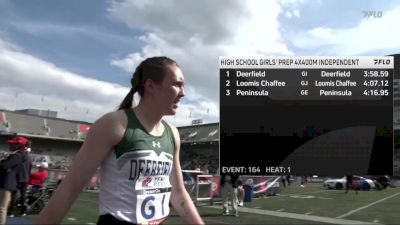 Replay: Penn Relays presented by Toyota | Apr 25 @ 9 AM
Replay: Penn Relays presented by Toyota | Apr 25 @ 9 AMApr 26, 2024
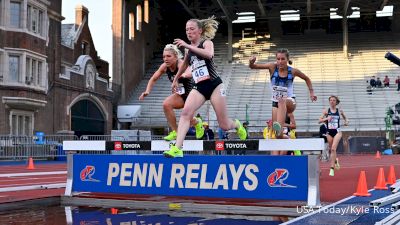 Penn Relays 2024 Schedule Day 2: Here Are Today's Events
Penn Relays 2024 Schedule Day 2: Here Are Today's EventsApr 26, 2024
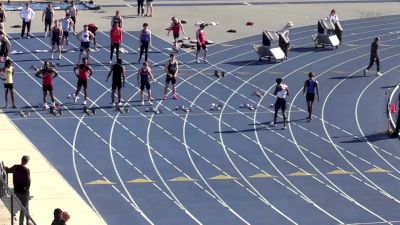 Replay: GVSU Extra Weekend | Apr 25 @ 12 PM
Replay: GVSU Extra Weekend | Apr 25 @ 12 PMApr 26, 2024
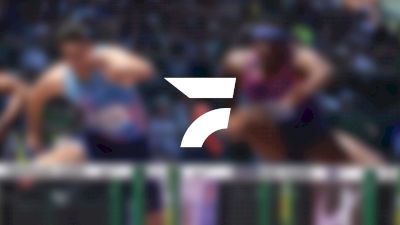 How to Watch: 2025 Ascension Seton Austin Marathon and Half Marathon | Track and Field
How to Watch: 2025 Ascension Seton Austin Marathon and Half Marathon | Track and FieldApr 26, 2024
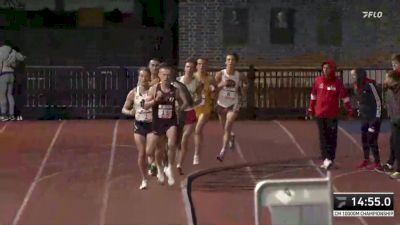 Men's 10k Event 210 - Championship, Finals 1
Men's 10k Event 210 - Championship, Finals 1Apr 26, 2024
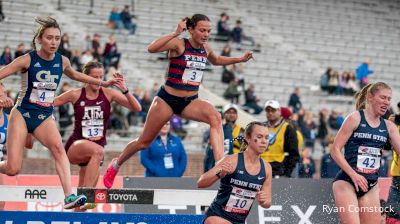 Penn Relays 2024 Results On Day 1: See Which NCAA Stars Won
Penn Relays 2024 Results On Day 1: See Which NCAA Stars WonApr 26, 2024
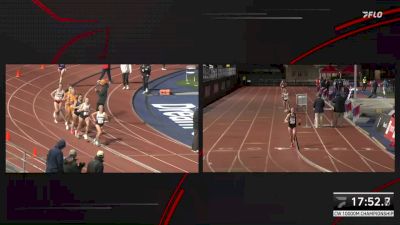 Women's 10k Event 209 - Championship, Finals 1
Women's 10k Event 209 - Championship, Finals 1Apr 26, 2024
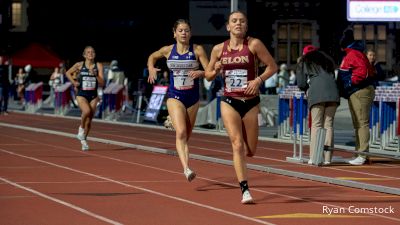 Jette Beermann Pushes To Win Women's 5000M Competition At Penn Relays
Jette Beermann Pushes To Win Women's 5000M Competition At Penn RelaysApr 26, 2024
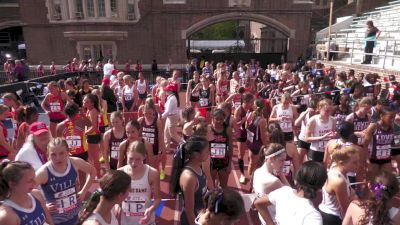 Replay: Paddock - 2024 Penn Relays presented by Toyota | Apr 25 @ 1 PM
Replay: Paddock - 2024 Penn Relays presented by Toyota | Apr 25 @ 1 PMApr 26, 2024